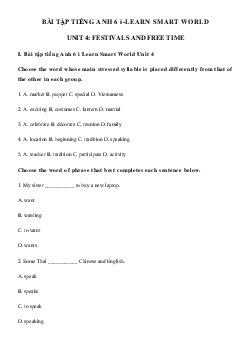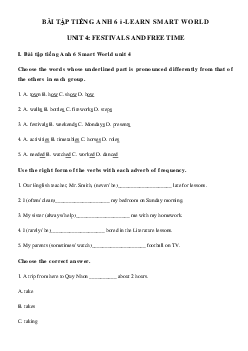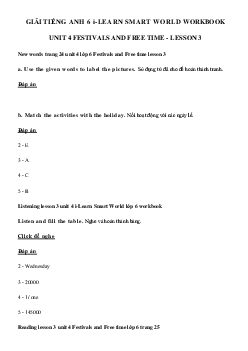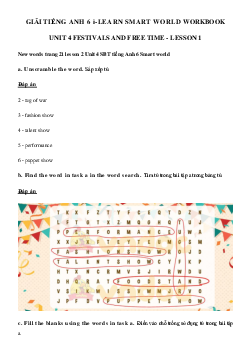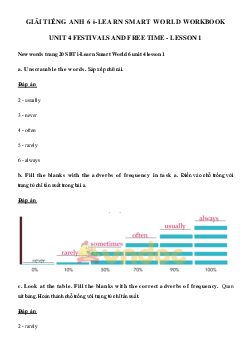



Preview text:
NGỮ PHÁP TIẾNG ANH 6 i-LEARN SMART WORLD
UNIT 4: FESTIVALS AND FREE TIME
I. Trạng từ chỉ tần suất trong ngữ pháp tiếng Anh 6
1.1. Định nghĩa trạng từ tần suất trong tiếng Anh
Trạng từ chỉ tần suất là trạng từ dùng để biểu đạt hay mô tả về mức độ thường xuyên xảy ra của
một sự kiện, hiện tượng nào đó. % Adverbs of frequency Examples 100% always (Luôn luôn)
I always brush my teeth at night. 90%
usually (Thường xuyên)
I usually walk to school. 70%
often (Thường thường) I often play soccer. 50%
sometimes (Thỉnh thoảng)
I sometimes sing a song. 5% rarely (Hiếm khi)
I rarely get bad marks. 0%
never (Không bao giờ)
I never go to school late.
1.2. Vị trí của trạng từ chỉ tần suất trong câu
Cách dùng trạng từ này tương tự như các trạng từ khác trong ngữ pháp tiếng Anh, đứng sau động
từ to be và trước động từ thường, và thường có các ý nghĩa như dưới đây:
● Trạng từ đứng sau động từ To be I am always late for school.
● Trạng từ đứng trước động từ thường He sometimes washes his car.
● Trạng từ đứng trước trợ động từ và động từ chính
Mary doesn't usually go to the cinema.
● Trong ngữ pháp tiếng Anh, trạng từ chỉ tần suất đôi khi đứng ở đầu câu hoặc cuối câu (trừ hardly ever, never)
Sometimes, I don’t understand what you are thinking.
II. Thì hiện tại đơn tả thì tương lai - Present Simple for future use
Thì hiện tại đơn diễn tả công việc cụ thể (có kế hoạch xác định) trong tương lai như là thời khóa
biểu hay chương trình, lịch trình cụ thể.
- The festival starts at 8.00 tomorrow. - The train leaves at 5.00.
III. Bài tập Ngữ pháp unit 4 lớp 6 Festivals and Free time có đáp án
Use the right form of the verbs with each adverb of frequency.
1. Our teacher, Mrs. Jones, (never/ be)____________________ late for lessons.
2. I (often/ clean)____________________ my bedroom at the weekend.
3. My brother (never/ help)____________________ me with my homework.
4. I (sometimes/ be)____________________ bored in the Maths lessons.
5. We (rarely/ watch)____________________ football on TV.
6. You and Tony (never/ play)____________________ computer games with me.
7. You (usually/ be)____________________ at the sports centre on Sunday.
8. The school bus (always/ arrive)____________________ at half past eight.
Give the correct form of the verbs in brackets.
1. We __________ (have) an English lesson on Monday. We___________ (not have) on Thursday.
2. Long ___________ (want) to go to the cinema on Sunday.
3. John __________ (be) a student. His brothers ___________ (be) workers.
4. Tomorrow __________ (be) Sunday. We ____________ (go) to Cuc Phuong National Park.
5. Mary often ___________ (help) her mother with the housework?
6. They ___________ (not work) at the factory now.
7. How ___________ (do) your father ___________ (go) to work every day?
8. Your parents ___________ (watch) TV in the evening?
9. Jenny _________ (go) home and ___________ (turn) on the radio.
10. Jane ___________ (miss) her parents so much when she ___________ (be) away from home.
Give the correct form of the verbs to complete the sentences.
1. Every Monday, Sally (drive) __________ her kids to football practice.
2. Be quiet! John (sleep)__________.
3. Don’t forget to take your umbrella. It (rain)__________.
4. I hate living in Seattle because it (rain, always) __________.
5. I’m sorry I can’t hear what you are saying because everybody (talk) __________ so loudly. ĐÁP ÁN
Use the right form of the verbs with each adverb of frequency.
1. Our teacher, Mrs. Jones, (never/ be)_______is never_______ late for lessons.
2. I (often/ clean) _______often clean_____ my bedroom at the weekend.
3. My brother (never/ help)_____never helps______ me with my homework.
4. I (sometimes/ be)_______am sometimes______ bored in the Maths lessons.
5. We (rarely/ watch)_______rarely watch_____ football on TV.
6. You and Tony (never/ play)_____never play______ computer games with me.
7. You (usually/ be)______are usually______ at the sports centre on Sunday.
8. The school bus (always/ arrive)______ always arrives______ at half past eight.
Give the correct form of the verbs in brackets.
1. We _____have_____ (have) an English lesson on Monday. We______don't have____ (not have) on Thursday.
2. Long _____wants_____ (want) to go to the cinema on Sunday.
3. John ____is______ (be) a student. His brothers ______are_____ (be) workers.
4. Tomorrow ____is______ (be) Sunday. We ______is going______ (go) to Cuc Phuong National Park.
5. Does Mary often ____help_______ (help) her mother with the housework?
6. They ______isn't working_____ (not work) at the factory now.
7. How _______does____ (do) your father _______go____ (go) to work every day?
8. Do Your parents _____watch______ (watch) TV in the evening?
9. Jenny ____goes_____ (go) home and _____turns______ (turn) on the radio.
10. Jane _____misses______ (miss) her parents so much when she _____is______ (be) away from home.
Give the correct form of the verbs to complete the sentences.
1. Every Monday, Sally (drive) _____drives_____ her kids to football practice.
2. Be quiet! John (sleep)____is sleeping______.
3. Don’t forget to take your umbrella. It (rain)____is raining______.
4. I hate living in Seattle because it (rain, always) _____is always raining_____.
5. I’m sorry I can’t hear what you are saying because everybody (talk) ____is talking______ so loudly.
